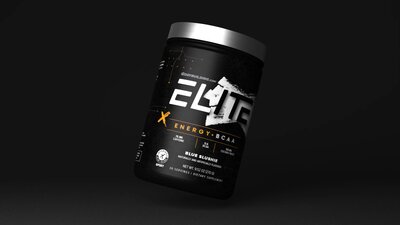If you are looking for a high quality supplement to help you perform at your best, you should try Bodybuilding.com Elite Energy + BCAA. This formulation has gone through a rigorous certification process by Informed Sport to ensure the quality of its ingredients and that it is free of any banned substances (1). This supplement stands above the many commercial sports nutrition products that are potentially contaminated with banned substances or dangerous chemicals (2)(3)(4).
This formulation provides you with seven ingredients to enhance your performance: 5,000 mg of Micronized BCAA 2:1:1, 75 mg of Natural Caffeine (from Camellia sinensis), 75 mg of TeaCrine® (Theacrine), 60mg of Dynamine™ (Methylliberine), 35 mg of Cognizin® (Citicoline), 150 mg of Raw Coconut Water, and 100 mg of Sodium (as Sodium Chloride).
Branched-chain amino acids (BCAAs) are important for athletes because of their potential role in protein synthesis, energy regulation, and muscle recovery (5). BCAAs are composed of three essential amino acids: leucine, isoleucine, and valine. Leucine helps regulate muscle protein synthesis (6). Isoleucine helps protein and fat metabolism by transporting glucose (7). Valine helps assist in the stimulation of muscle regeneration (8). Of the three BCAAs, leucine has been shown to be most important, which is the reason this formulation has two parts leucine to isoleucine and valine ratio. A meta-analysis of scientific literature showed how BCAA supplementation activates anabolic signals and helps recovery by attenuating muscle damage and ameliorating muscle soreness (9)(10). By consuming 5,000 mg of BCAA’s, you can increase your amino acid availability for accelerated protein synthesis and muscle growth (11).
A placebo controlled study compared the effects of caffeine versus a combination of caffeine, Dynamine™, and TeaCrine® (CDT). CDT was shown to be a safe and effective product for improving cognitive performance without increasing self-reported anxiety or headaches. It also showed the potential synergistic effect of combining these compounds for increased attention, cognitive control, and energy mobilization (12).
The 75mg of caffeine in this supplement comes from the plant camellia sinensis, which is commonly used to make tea. Caffeine has been scientifically proven to boost your aerobic and anaerobic performance by increasing your muscular endurance, power output, high-intensity interval training, and resistance to fatigue (13)(14)(15)(16).
TeaCrine® is a registered trademarked supplement that is chemically equivalent to theacrine. Theacrine is a safe and effective product, extracted from the tea plant camellia kucha (17).Theacrine supplementation is theorized to enhance mood state, increase energy production, heighten mental focus, and strengthen motivation, similar to caffeine (17). However, theacrine may have additional benefits, such as being anti-inflammatory, less habit forming, and having a longer cognitive effect (18). Therefore, taking this supplement can boost the effect of caffeine, as well as provide you with a source for sustained mental focus (19).
Dynamine™ is a trademarked product containing methylliberine, which is a caffeine metabolite present in various coffee plants (20). Methylliberine exhibits similar structure and pharmacological effects as caffeine (21). However, methylliberine absorbs more quickly than caffeine, with a peak saturation between 30 and 60 minutes (22). Therefore, taking this supplement can provide you with a faster source of mental focus.
Citicoline is a naturally occurring chemical in the brain that is theorized to play an important part in memory formation (23). Cognizin® is a patented pure form of citicoline that supplies your brain with the energy it needs to stay sharp (24). Citicoline supplementation is thought to promote transmission and synthesis of neurotransmitters important to memory (25). A systematic review found that citicoline was useful in preventing dementia progression, as well as enhancing cognitive and learning functions among healthy individuals (23).
Coconut water is rich in electrolytes, vitamins, minerals, cytokines, and proteins with a long history of medicinal qualities, including hydration, anti-aging, antimicrobial, and energy enhancement (26). Coconut water is an alkaline beverage with high levels of potassium and glucose, making it an important alternative for oral rehydration. (27)(28). In a study comparing coconut water to carbohydrate-electrolyte sport drink, both were found to have similar effects on hydration (29).
Works Cited
https://sport.wetestyoutrust.com/about/certification-process
https://www.ncbi.nlm.nih.gov/pmc/articles/PMC4446786/
https://www.ncbi.nlm.nih.gov/pmc/articles/PMC6835847/
https://pubmed.ncbi.nlm.nih.gov/31911801/
https://www.medrxiv.org/content/10.1101/2021.01.05.21249234v2
https://pubmed.ncbi.nlm.nih.gov/290921/

